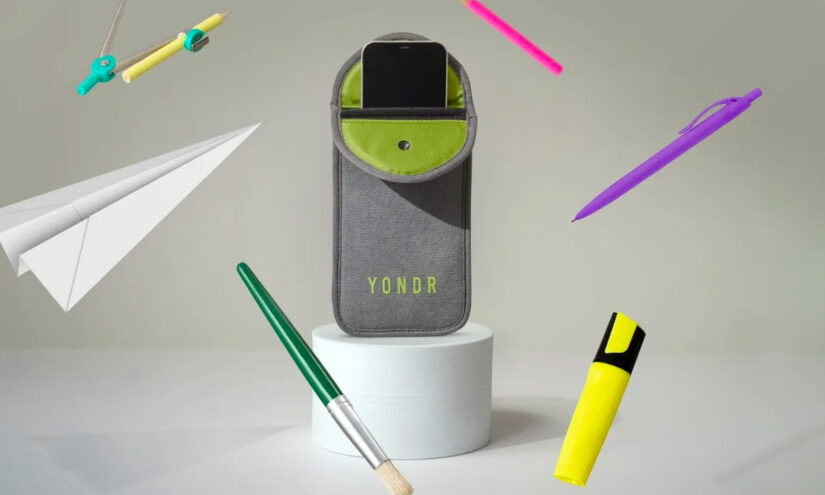Reflecting on the tenets that shape our educational practices is fundamental for …
Cellphone Pouches to Be Tested in Schools Throughout Delaware
Emma Wordsmith

The academic year 2021-22 presented significant challenges for Nicholas Wolfe, the Principal of George Read Middle School, who has been an educator for 17 years. This year marked the school’s return to full operation following the COVID-19 pandemic.
Amid recognizing the struggles of his students, Wolfe delved into investigating the impact of cellphones and social media on the mental health of adolescents.
“It was one of those things where it’s like, I can’t unknow now what I know, and I need to take action,” said Wolfe. “From there, it’s like, ‘All right, what are the ways that I can get to a phone-free environment here at George Read Middle School?’”
Since the start of the 2022-23 academic year, Wolfe has implemented a structure based on “expectation and enforcement of the expectation” to establish a phone-free setting at George Read Middle School, utilizing YONDR phone pouches to enforce the expectation without imposing a complete phone ban.
Part of this year’s one-time supplemental spending bill in Delaware is aimed at reducing distractions caused by phones and social media in classrooms. Lawmakers have allocated $250,000 to pilot the expansion of phone-hiding pouches and other measures in middle and high schools across the state.
The Delaware Department of Education will oversee the pilot program, enlist experts, formulate the system for implementation, and subsequently evaluate its effectiveness. Additionally, the department will establish the application guidelines for districts seeking funding.
State Senator Eric Buckson (R-Dover), a former educator, expressed strong support for the pilot initiative, citing teacher feedback during Teacher Appreciation Days as instrumental in its inception.
“I asked [teachers], ‘Hey, if you were king or queen for a day and could write the rules, what’s one of the first things that you would do to get better control of the hallways and the classrooms?’” Buckson noted. “Either No. 1 or No. 2 on that list is to take the phones.”
The Delaware State Education Association, representing public school teachers, commended the General Assembly for addressing educators’ concerns and seeking solutions to behavioral issues in schools, according to Taylor Hawk, the Association’s director of legislation and political organizing.
“that is absolutely encouraging, and we definitely see the cellphone pilot as another example of legislators being responsive to issues that they’re hearing from educators in their districts and we look forward to seeing the results,” Hawk stated.
Various school districts nationwide, such as the Los Angeles Unified School District and all of Florida, have introduced their own policies mandating phone pouches in schools, albeit critics raise safety concerns in emergency situations involving students and their families.
Despite these objections, Wolfe has navigated a balanced approach, allowing students to access phones when necessary by seeking permission from administrators while ensuring compliance with the phone-free environment at George Read Middle School.
Concerns surrounding Delaware’s recent test scores have prompted calls for improved academic outcomes. During the 2022-23 school year, only 24% of eighth-grade students demonstrated proficiency in math, while 41% achieved proficiency in English/language arts.
Hoping to witness positive changes post-implementation of the pilot program, experts highlight the link between media multitasking and attention issues, with early adolescents vulnerable to long-term adverse effects.
Kenneth Shores, a University of Delaware assistant professor specializing in education policy, noted similar distractions among adult learners in college classes due to mobile phones.
“Not everyone is convinced that phone bans are an easy solution to rectifying behavior and improving test scores,” said Britney Mumford, the executive director of DelawareCAN, emphasizing the need for a multifaceted strategy to enhance engagement and academic performance.
Hawk echoed the sentiment, indicating that while phone policies are discussed in addressing behavioral issues, they should be complemented by initiatives like enhancing mental health resources.
Buckson foresaw potential funding shortages for phone pouches and acknowledged direct outreach from schools facing such constraints.



